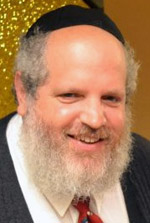By Rabbi Yeruchem Eilfort

CARLSBAD, California — This week’s Torah portion is titled Korach, who was known as a very bad person who came from wonderful stock. Korach was a rebel. He accused Moses and Aaron of nepotism. Korach was an expert at making populist pronouncements while in fact he was an elitist. Korach was insincere. Korach ridiculed the Torah and its number one expert, Moses.
And yet, a portion of the Torah is named after him!
In Positivity Bias, Rabbi Mendel Kalmenson explains Korach according to the insights offered by the Rebbe, Rabbi Menachem Mendel Schneerson, of righteous memory. While all of the above statements regarding Korach are perfectly true, which is why he was unsuccessful, there is an underlying truth in some of the things he said. In particular Korach argued against the hierarchical system instituted by G-d through Moses.
What ‘triggered’ Korach was Aaron’s appointment as High Priest / Kohen Gadol, and Aaron’s sons, and only his sons and their progeny, as future Kohanim. Korach thought that his family had been passed over and he sought to set things right. Instead of directly asking for the priesthood, which at least would have been honest and sincere, Korach attacked the very system and its administrator, Moses. Moses explained to Korach, diplomatically at first and more forcefully as Korach continued his rabble-rousing, that it was not he but instead it was the Almighty who set up the system and appointed Aaron. Moses confided to Korach that he too wanted to be a Kohen, but that was not G-d’s plan, so he respectfully deferred. He urged Korach to do likewise.
In arguing against the system Korach stated that all of the Jewish people are holy, so why should Aaron be placed above them? It was in this statement that Korach was factually correct; all of the people ARE holy! Beyond being holy every person is of critical importance to the Divine Plan.
What we need to do is understand that although every ‘member of the tribe’ may be holy, it does not mean we should all have the same role. This point was emphasized by Moses when issuing his challenge to Korach to offer incense, something that is normally strictly within the purview of the Kohen and only under very specific circumstances. Moses stated that in the morning they would come to understand where these differentiations in status came from.
Why in the morning specifically?
Moses was emphasizing that just like there is morning and night there are Kohanim, Levites, and Israelites. Just like there are Jews and Gentiles, men and women, and up and down. The Creator created with certain rules and roles. Is the role of an Israelite different than that of a Kohen? Absolutely yes. Is it less important than that of a Kohen? Absolutely not!
The Torah recognizes differences in the roles of people just like there is a day and there is a night. The boundaries (different roles) are important in fulfilling the plan of the Almighty.
Traditional values have come under increasing attacks of late. People are outraged by the notion that different people can have different roles and they (falsely) claim that their rights are being infringed upon because their role is different. It seems that these very arguments were already foreseen some 3,300+ years ago and answered.
We must not fool ourselves and exchange our value system for that of the secular world. Our merchandise is superior to theirs. It is precisely our value system that has endowed us with all of our best qualities, and the fact is when we are at our best the world is at its best!
Shabbat Shalom!
*
Rabbi Yeruchem Eilfort is Director of Coastal Chabads and Chabad at La Costa. Rabbi Eilfort welcomes readers’ comments and questions and may be reached at RabbiE@ChabadatLaCosta.com.